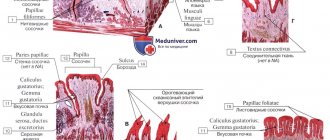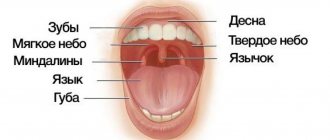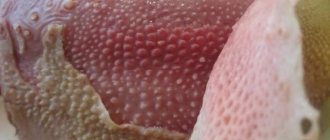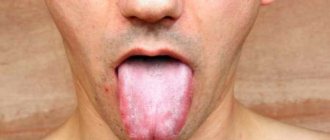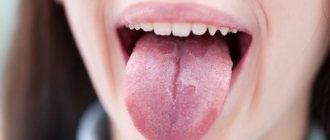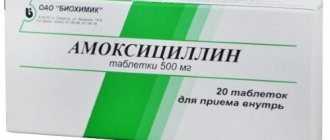A folded tongue is a congenital pathology characterized by abnormalities in the shape and size of the tongue. In approximately half of the cases, this pathology manifests itself together with desquamative glossitis. The folded tongue is also called “scrotal”. This pathology is one of the most common symptoms of Melkersson-Rosenthal syndrome.
Folded tongue: photos and symptoms
Usually the anomaly is detected in early childhood, but it also occurs in adults, since sometimes this problem does not bother the patient in any way, and the person is not even aware of its presence. The signs of the disease are as follows:
- Macroglossia, or enlargement of the tongue, which can affect a person's speech and chewing function. Usually the patient keeps his teeth in an open position.
- Folds and grooves appear on the surface, which are covered with papillae.
- The tongue is significantly thickened.
- The back and tip of the tongue are smoothed, the filiform papillae have atrophied.
- Increased sensitivity (especially in people who have undergone infectious diseases and surgical operations).
- Regular tingling and pinching sensation.
- Lymph nodes are enlarged.
- Smell from the mouth.
The folds, in turn, are different: transverse, deep longitudinal (and not very deep), fringed. Usually the main longitudinal fold (it is the largest and deepest) runs from the tip along its midline. The remaining folds lead exactly to it.
Sometimes this pathology accompanies desquamative glossitis (geographic tongue) - this is inflammation, as a result of which some areas of the organ become several shades lighter or acquire a gray tint. In general, the picture of the organ resembles a map, which is why it got its name.
What is dangerous, consequences
With proper care, the grooved tongue does not cause discomfort to the owner. Failure to comply with important points of care for a diseased organ and neglect of the disease can lead to the appearance of various infections, for example:
- Catarrh;
- Candidal glossitis;
- Phlegmon;
- Abscess;
- Hyperkeratosis.
There is also a risk of tongue cancer. Acromegaly may occur when both cheeks and tongue are folded. In case of inflammation, you need to brush your teeth very carefully so as not to touch the painful surface of the organ with the brush.
Geographic fold tongue
There is also a condition called geographic tongue (desquamative glossitis). It is characterized by the presence of reddish or gray spots on the surface. They are separated from each other by yellowish formations of thread-like nipples. Thanks to this, the organ resembles a geographical map. Often, scrotal tongue becomes one of the concomitant diseases.
Melkersson-Rosenthal syndrome
The disease presents with significant swelling of the lips and tongue, as well as facial nerve palsy. Folding is a symptom of the disease in half of the cases.
Folded tongue with white spots
White spots may be signs of concomitant pathologies. Among them:
- Desquamative glossitis;
- Melkersson-Rosenthal syndrome.
- Candidiasis glossitis.
Our team of doctors
Maxillofacial surgeon, Implantologist
Bocharov Maxim Viktorovich
Experience: 11 years
Dental surgeon, Implantologist
Chernov Dmitry Anatolievich
Experience: 29 years
Orthopedist, Neuromuscular dentist
Stepanov Andrey Vasilievich
Experience: 22 years
Endodontist, Therapist
Skalet Yana Alexandrovna
Experience: 22 years
Orthopedic dentist
Tsoi Sergey Konstantinovich
Experience: 19 years
Dentist-orthodontist
Enikeeva Anna Stanislavovna
Experience: 3 years
Geographical language. What kind of disease is this and how to deal with it?
Geographic tongue (benign migratory glossitis) is an inflammatory disease that manifests itself as lesions on the back and sides of the tongue.
Typically, the affected tongue has a "bald" red area of varying sizes that is partially surrounded by an irregular white border.
The appearance of the affected part of the tongue is the result of the loss of finger-shaped projections (papillae) that cover the surface of the tongue. From time to time, similar lesions appear in other parts of the mouth - the palate, cheeks, under the tongue or on the gums. This is called geographic stomatitis or erythema migrans.
Geographic tongue can vary in color, shape and size - hence the name. Manifestations can persist for different periods of time - days, months and even years. They often disappear completely on their own. But they may appear again later.
What causes geographic language?
The causes of this disease are not fully known. Factors suspected include emotional stress, bad habits, allergies, diabetes and hormonal imbalances. An association between geographic tongue and psoriasis has been reported. However, none of these factors have been conclusively linked to geographic language.
Who gets geographic language?
Geographic tongue is a fairly common condition. Some reports in the medical literature indicate that geographic tongue affects women slightly more often than men. This can happen at any age, including in childhood. It is estimated that it may occur in 1-2.5% of the population.
Is it possible to get infected with it?
No, geographical language is not contagious. There is no evidence that the disease is transmitted in any way.
How is geographic tongue diagnosed?
Based on clinical examination and detailed history.
Are there any complications?
Geographic tongue is a disease that does not pose a threat to general health.
Does geographic tongue require treatment?
In most cases, there is no need to treat this condition.
Apart from appearance, geographic language in most cases does not manifest itself in any way. Sometimes it can cause unpleasant sensations: burning, tingling of the tongue, most often associated with eating spicy or sour foods.
If discomfort persists, your pediatrician may recommend anti-inflammatory medications (topical corticosteroids, such as triamcinolone in toothpaste applied several times a day as needed) or pain medications (local analgesics) applied directly to the affected areas. Antiseptics and anesthetics may also be effective.
Some authors have reported that the use of cyclosporine, topical and systemic antihistamines, and topical retinoids can sometimes produce beneficial results.
Can geographic tongue transform into cancer?
There are no documented cases of geographic tongue causing cancer.
Should you see a doctor if you suspect geographic tongue?
Geographic tongue is an uncomfortable condition but does not cause health problems. However, tongue damage can be a sign of other serious illnesses.
If you or your child has tongue lesions that do not go away within 10 days, be sure to contact your primary care physician/pediatrician or dentist.
Possible causes of pathology
The exact causes of the anomaly are unknown. But there are a number of factors that can provoke the appearance of pathology:
- chronic diseases of the liver, stomach, duodenum;
- skin diseases;
- pathologies of the nervous system;
- pathologies of the endocrine system;
- bone marrow diseases;
- acute infections;
- violation of the mucous membrane of the tongue and its trophic function;
- lack of vitamins and essential microelements in the body;
- collagenosis;
- human reaction to vaccination;
- hormonal changes (pregnancy, menopause, lactation).
Other reasons
- Avitaminosis.
A deficiency of microelements can cause sensitivity of the mucous membranes and the appearance of cracks in the tongue. - Allergy.
New dental care products and foods can cause increased sensitivity of the gums and tongue. - Worms.
The presence of parasites leads to the fact that the body does not absorb nutrients and beneficial microelements, which causes the condition of the mucous membrane to worsen. - Hormonal disbalance.
- Stress.
How to determine health status by language. Source: Yulianna Pliskina YouTube channel
Treatment of folded (scrotal) tongue
The anomaly usually does not bother its owners, however, sometimes they complain about its appearance: cracks.
A folded (scrotal) tongue requires especially careful care. Because food residues may be trapped in the folds. Because of this, bad breath occurs, as well as accompanying unpleasant symptoms: burning and inflammation.
In addition, the grooves may bother people who have suffered acute infections or surgical interventions. The reasons in this case are also clear: the overall tissue reaction in the body decreases, and the sensitivity of the surface of the folded tongue increases significantly. Therefore, it reacts painfully to chemical irritants and drugs.
If the patient does not properly care for the diseased organ, then the inflammatory processes can drag on, and this is a very favorable place for the development of fungal infections.
The dentist treats this pathology. It is he who will select oral care.
Sometimes a folded tongue requires surgery. This happens in cases where the organ is too enlarged and interferes with the patient. The operation involves excision of part of it.
So, in general, drugs are used to eliminate related problems:
- Fungal and bacterial diseases: anti-inflammatory, antifungal drugs, immunocorrectors, antiseptic treatment.
- Candidiasis: clotrimazole cream, shading with aniline dyes, 10% sodium borate solution in glycerin.
- Painful sensations: antiseptic rinses, mouth baths with citral solution, application of medications with anesthesin.
Diagnostics
This diagnosis is made based on the overall clinical picture. It is important to take into account that this pathology is one of the symptoms of Melkersson-Rosenthal syndrome. This means that a folded tongue can be either a congenital or acquired pathology.
It is very important at the diagnostic stage to differentiate the pathology of the folded tongue and sclerosing glossitis, which is similar in manifestations. This change in the structure of the tongue occurs against the background of secondary syphilis. In this case, a similar structure of the tongue, resulting from an increase in the size of the connective tissue, is accompanied by compaction and decreased mobility. The folded tongue, on the contrary, is quite soft, although larger in size. There are no difficulties when chewing or speaking.
Features of care
If you have this pathology, you do not need to self-medicate; careful care and supervision by a specialist are required. In general, you should take care of your oral cavity as follows:
- general oral hygiene;
- rinsing;
- if the patient uses removable dentures, they should also be thoroughly cleaned after eating;
- it is necessary to avoid spicy, salty food, it should not be too hot or cold;
- giving up bad habits (smoking, alcohol);
- You need to brush your teeth with a special paste;
- the toothbrush should be made of synthetic materials: this will help avoid damage;
- regular visits to the dentist.
Such careful care will help neutralize the oral cavity from bacteria, which will prevent their proliferation and the occurrence of associated infections.
Author:
FAQ
How to distinguish leukoplakia from a folded tongue?
Leukoplakia has different symptoms from a grooved tongue. It should be taken into account that some of them may appear if the scrotal disease is not properly cared for.
- Inflammation and swelling of the mouth and tongue;
- Horny formations with a white coating;
- Ulcers and erosions;
- Bleeding of the affected areas;
- The mucous membrane of the mouth and tongue becomes denser and harder;
- Rapid growth of painful formations;
- Proliferation of papillae in affected areas.
Can the tongue bend poorly due to folding?
Most often, the scrotal tongue is soft and mobile. If the bending of this organ is poor, you should consult a specialist. This may be a sign of sclerosing glossitis.
Is it possible to use sea buckthorn if you have a folded tongue?
Yes, you can.
Do they die from this?
No. The main thing is to follow all the points of caring for such a tongue, otherwise other infections may arise, which can lead to very serious consequences.
Is folded tongue a disease?
Yes, this is considered a disease, but it does not threaten the owner with proper care.
Disease prevention
In most cases, this pathology does not bother a person, however, for this to continue, the organ must be looked after. Here are some recommendations for preventing inflammation of the scrotal tongue:
- regular oral hygiene. Microparticles of food can get stuck in the furrows (especially if they are deep enough) and rot. This is a favorable microsphere for the development of various bacteria and unpleasant odors,
- irrigating the tongue or rinsing the mouth after eating with special rinses, herbal infusions, baking soda solution,
- careful care of removable dentures and orthodontic structures, as they hinder the natural cleansing of the mucous membrane,
- exclusion from the diet of spicy, salty, too cold or hot dishes, as they are an additional irritant to the papillae on the mucous membrane,
- quitting smoking and alcohol,
- using a special children's toothpaste and a toothbrush with soft synthetic fibers to clean your teeth to avoid injury to the organ,
- Regular (at least once every 6 months) visits to the dentist.
It is important to know! Insufficient care of the scrotal tongue or ignoring foci of inflammation in it is dangerous for the development of severe infectious lesions (catarrhal inflammation, candidal glossitis, phlegmon, abscess, hyperkeratosis) and even cancer.
Types of folds on the tongue
Natural folds in the tongue are classified based on their location and direction. So, there are several types of grooves on the organ:
- fringed, which are located under the tongue,
- longitudinal,
- transverse.
The main longitudinal (vartical) fold extends from the tip to the midline of the tongue. It is the most noticeable and deep. On the lower surface of the organ there are so-called fringed folds - thus forming a system of grooves on the tongue.
Treatment
A folded tongue can be a separate disease, or it can be a symptom of a serious chronic illness. Therefore, the treatment of this pathology may differ in different patients.
As a rule, if the folded tongue does not bother the patient in any way, then he is not given any specific treatment. Typically, such people are only advised to pay more attention to the hygienic care of their tongue, not allowing food debris to accumulate in the tongue folds.
However, if the disease becomes complicated and develops into glossitis, then treatment becomes necessary.
If the signs of scrotal inflammation of the tongue tissue are a manifestation of a general pathology in the body (for example, it is one of the symptoms of a disorder of the cardiovascular, endocrine, respiratory or digestive systems), then the underlying ailment must be treated.
Drug treatment
The following measures are usually used in the treatment of glossitis:
- root cause control and comprehensive examination;
- anti-inflammatory treatment using antibiotics;
- corticosteroids for rapid relief of acute inflammation;
- use of antimycotics (to fight fungal infections);
- immunity-boosting drugs;
- rinsing and irrigating the mouth with herbal decoctions;
- local and general anesthesia using tablets and gels;
- sanitation of the oral cavity.
If glossitis bothers the patient as an aesthetic defect, laser treatment is often effective. At the same time, the folds seem to evaporate and smooth out, and the tongue itself shrinks and becomes more even.
Surgery
Surgical treatment is not often used for scrotal glossitis. It involves surgically suturing the grooves of the tongue. After the surgical stage, restorative treatment using laser and medications is used.
The postoperative period after such suturing usually passes quickly. In this case, it is recommended to maintain “speech rest”, a minimum of chewing movements and gentle diet therapy.
After treatment for a folded tongue, it is important for the patient to reduce all risk factors as much as possible:
- eliminate alcohol and smoking;
- monitor oral hygiene;
- treat dental ailments in a timely manner;
- use high-quality fillings.
Folded tongue is not a serious illness, and the prognosis for patients is quite favorable. For such people, it is enough to be attentive to oral hygiene, paying special attention to cleaning the tongue. Symptoms that indicate an infection or other complications in the mouth should cause concern. Then it is unacceptable to refuse to contact specialists. Otherwise, the quality of life of people with this language anomaly is high enough to live long and joyfully.
Sources used:
- Rapini, Ronald P.; Bolognia, Jean L.; Jorizzo, Joseph L. Dermatology: 2-Volume Set. —St. Louis: Mosby, 2007.
- Rationale for the prevention of cancer of the oral mucosa, tongue, lip / Bulyakov R. T., Sh. Kh. Gantsev and O. A. Gulyaeva. — M.: LAP Lambert Academic Publishing
- Guide to practical dentistry: monograph. / L. Baum, R.V. Phillips, M.R. Lund. — M.: Medicine
- National Library of Medicine (USA)
Diamond tongue
The lesion is localized on the back of the organ; the tissues in this area, due to thickening of the epithelium, acquire a clearly defined oval or diamond-shaped shape. Diamond-shaped glossitis of the tongue, as in the photo, occurs chronically, but with periods of exacerbation. Often recurs. If treatment is not carried out, then neoplasms appear on the affected tissues, similar in appearance to papillomas or warts, covered with keratinized epithelium. May develop into a malignant tumor.
This is what rhomboid glossitis looks like
